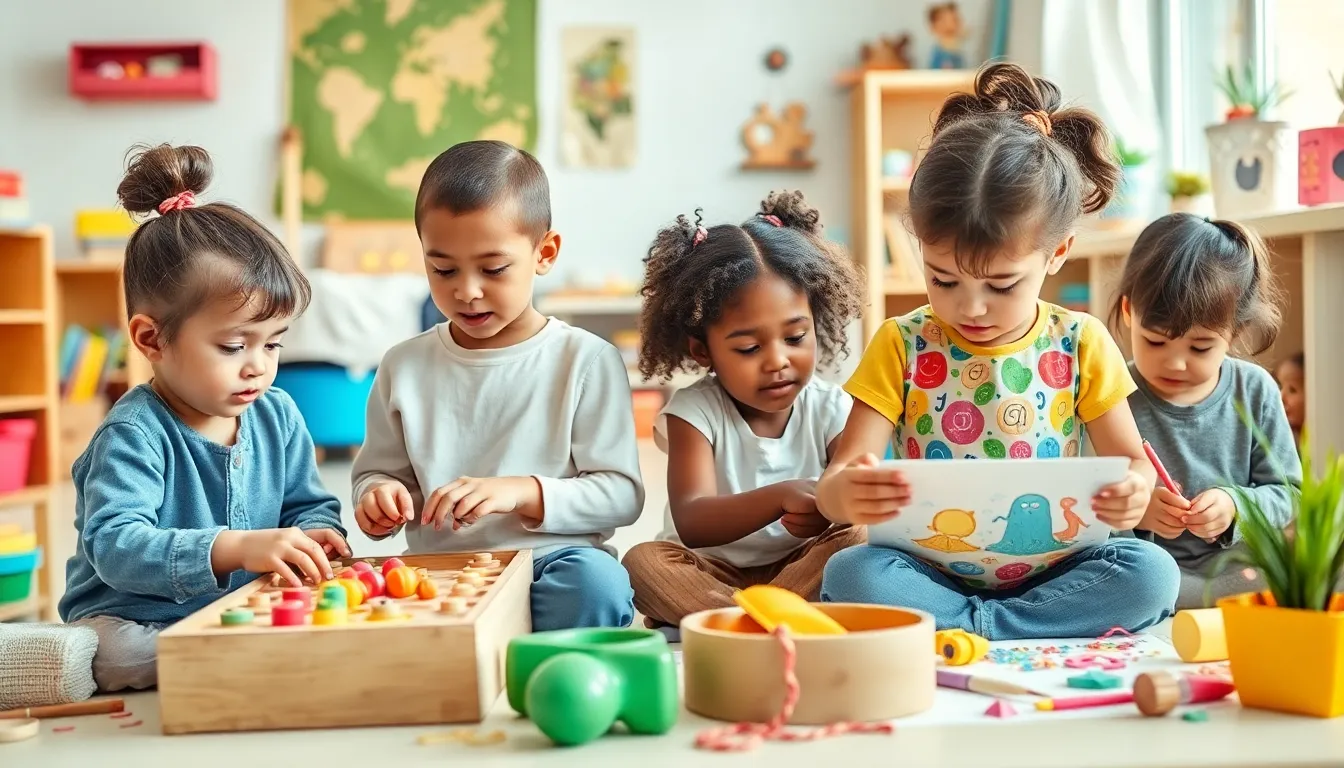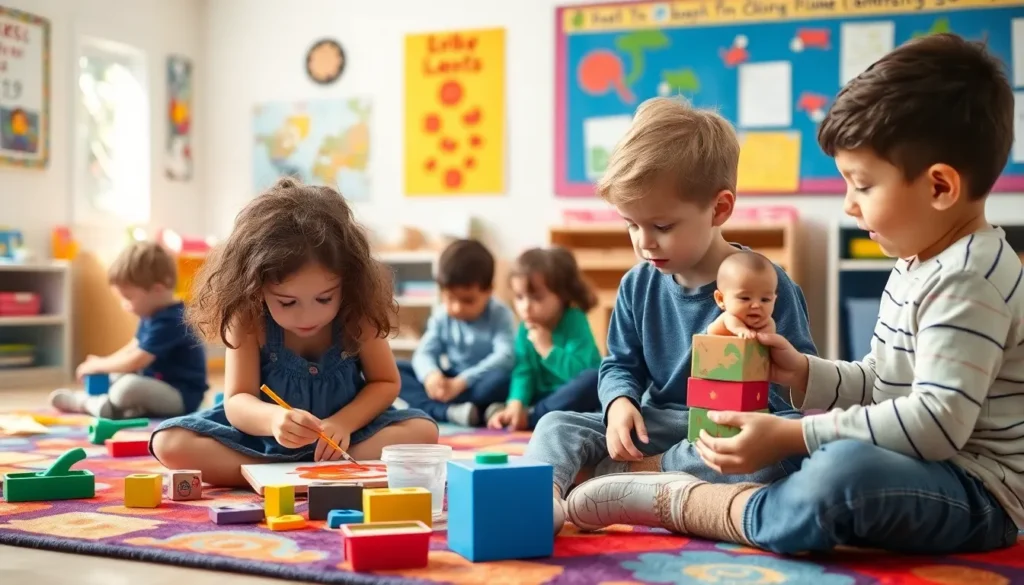Table of Contents
ToggleEarly learning isn’t just about crayons and nap time; it’s the secret sauce to setting up a lifetime of success. Imagine a world where toddlers transform into little Einsteins, all thanks to engaging activities that spark their curiosity. It’s like giving them a head start in a race where knowledge is the ultimate prize.
In a society that often prioritizes academic achievement, the importance of early learning can’t be overstated. It’s the foundation upon which critical thinking, creativity, and social skills are built. So, why not invest in those adorable little minds while they’re still figuring out how to tie their shoelaces? With the right approach, early learning can be both fun and impactful, ensuring kids are not just ready for school, but ready for life.
Importance Of Early Learning
Early learning plays a vital role in shaping children’s overall development. It lays the foundation for various skills that enhance their future success.
Cognitive Development
Cognitive development occurs through engaging activities that stimulate a child’s brain. Exploring their environment sparks curiosity and encourages problem-solving. Research shows that 90% of brain growth happens before age five, which highlights the importance of intellectual stimulation during this period. Exposure to diverse learning experiences can enhance memory, language abilities, and logical thinking. Engaging in age-appropriate games and challenges nurtures critical thinking, enabling children to make connections and understand their surroundings better. Developing these cognitive skills prepares them for complex academic tasks later in life.
Social Skills Development
Social skills development begins in early learning environments. Interaction with peers fosters communication, cooperation, and empathy. Children learn to share and take turns during group activities, which promotes teamwork. Studies indicate that strong social skills correlate with academic success and emotional well-being. Building relationships with teachers and classmates allows children to practice conflict resolution and develop emotional intelligence. Engaging in collaborative projects encourages them to express thoughts clearly and build confidence. These foundational social skills create a supportive environment where children thrive both in school and later in their personal lives.
Different Approaches To Early Learning

Early learning encompasses various methodologies that cater to a child’s developmental needs. Each approach emphasizes distinct aspects of growth, ensuring a comprehensive foundation for future learning.
Montessori Method
The Montessori method emphasizes self-directed learning. Children choose activities that interest them, fostering independence and responsibility. Materials used in this approach are designed to be accessible and hands-on, allowing children to explore concepts at their own pace. Teachers act as guides, facilitating rather than directing learning. This method nurtures critical thinking and problem-solving skills, essential for lifelong success.
Reggio Emilia Approach
The Reggio Emilia approach focuses on child-led exploration. Children express their thoughts and ideas through various mediums, such as art and verbal communication. This method promotes collaboration among peers, encouraging social interaction and teamwork. Teachers document children’s learning experiences, which helps tailor educational activities to individual needs. This approach values each child’s voice, reinforcing confidence and creativity.
Traditional Learning
Traditional learning relies on structured curriculum and teacher-led instruction. It typically involves set lessons in core subjects like math, reading, and science. Assessments are common, providing measurable progress indicators. Although this method emphasizes discipline and routine, it may limit creative expression and independent exploration. While important skills are taught, children might benefit from more diverse forms of learning.
Tools And Resources For Early Learning
Early learning thrives with the right tools and resources. These essential elements support children’s development and engagement.
Educational Toys
Educational toys enhance cognitive and social skills through play. Manipulative toys, such as building blocks and puzzles, promote fine motor skills and problem-solving. Interactive games encourage teamwork and communication, fostering essential social interactions. Art supplies like crayons and paints stimulate creativity, allowing self-expression. Books that feature colorful illustrations and engaging stories boost language development, igniting a love for reading. Selecting age-appropriate toys matters, ensuring they challenge while remaining accessible. Parents and educators can create stimulating environments that support varied learning experiences.
Online Resources
Online resources provide a vast array of learning opportunities for young children. Websites designed for early learners feature interactive games that engage them in educational content, enhancing their critical thinking and vocabulary. Educational apps cater to various subjects, offering fun ways to practice math and reading skills. Online videos present storytelling and educational cartoons, making learning entertaining. Additionally, platforms like Khan Academy Kids and ABCmouse facilitate structured learning paths that align with children’s developmental stages. Utilizing these digital tools allows parents and educators to personalize learning experiences, contributing to holistic development.
Challenges In Early Learning
Early learning faces several challenges that impact the effectiveness of educational experiences for young children. Addressing these issues is crucial for fostering optimal development.
Accessibility Issues
Accessibility remains a significant challenge in early learning. Many families lack access to high-quality educational resources. Geographic location often influences the availability of early learning programs, with urban areas typically offering more options than rural ones. Financial constraints also play a role, as low-income families may struggle to afford quality early education. Additionally, children with disabilities encounter barriers that limit their participation in mainstream programs. Ensuring equitable access to early learning facilities fosters inclusion and supports the development of all children.
Parental Involvement
Parental involvement is vital in early education, yet many parents face barriers to engagement. Work commitments can hinder participation in their child’s learning journey. Limited knowledge about developmental milestones may prevent them from recognizing how to support their child’s education. Additionally, some parents may feel intimidated by the educational system, leading to disengagement. Encouraging open communication between educators and families enhances parental involvement. Workshops and resources aimed at parents can build confidence and empower them to take an active role in their child’s early learning.
Early learning lays a vital foundation for children’s future success. By prioritizing engaging and stimulating experiences, parents and educators can nurture curiosity and essential skills. The diverse approaches to early education offer unique benefits, allowing children to thrive in various ways.
Investing in high-quality resources and fostering parental involvement can significantly enhance a child’s learning journey. Addressing accessibility challenges ensures that all children can benefit from these crucial early years. Ultimately, the focus on early learning not only prepares children for school but also equips them with the tools they need for a fulfilling life ahead.







